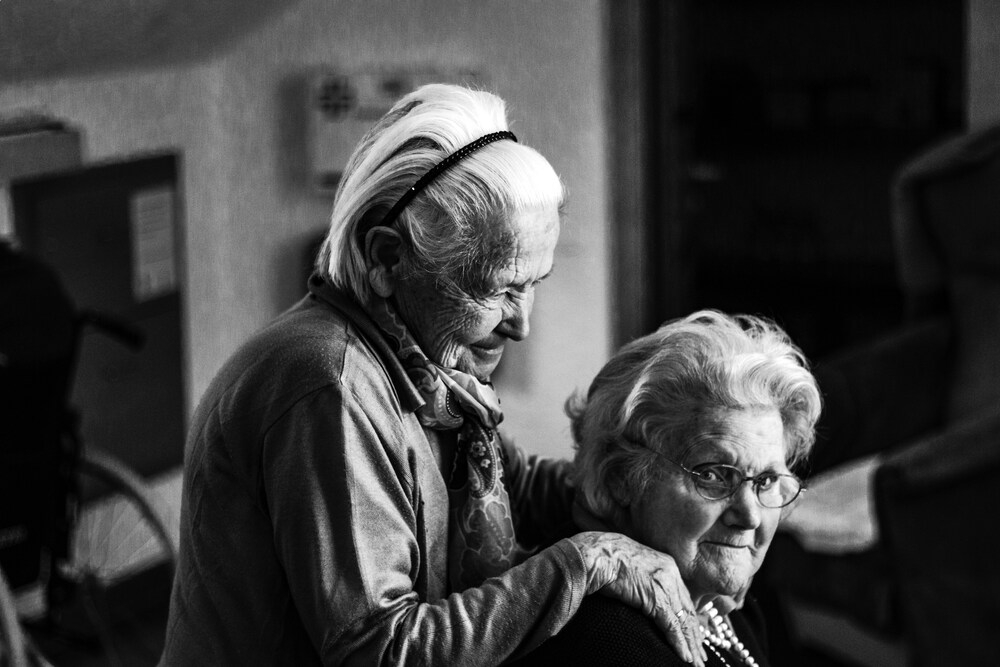Music for Senior Living Homes
Unlock the Power of Music in Senior Living Homes" explores how music programs significantly enhance seniors' lives, offering emotional, cognitive, and physical benefits. Learn about innovative solutions to implement music therapy, live performances, and interactive sessions, and discover how these programs transform senior care. A must-read for anyone interested in the intersection of music, wellness, and elder care.
There's more music!
That's only the tip of the iceberg. We have many more songs, all available with our lifetime licenses:
Why you should purchase from us
Discover the simplest and most cost-effective way to secure a lifetime license – pay once and never worry about account creation or password hassles again! Our licenses are your ticket to the best music, valid for any project, forever.
Get your license now!Use our music on...
Music Plans
Pay once, use for a lifetime
You’ll never have to worry again about copyrights or claims.
Starter
Suited for personal projects and social media (Youtube not included)
$49 / forever
Buy plan- Personal projects
- Social Media
- Clients work
- Online Advertising
- TV, Cinema and Radio
Personal
Most popular
Ideal for Youtube. apps, podcast and gameplays. Unlimited downloads and channels.
$99 / forever
Buy plan- Social Media
- Youtube & Streaming
- Apps & Videogames
- Clients work
- Online Advertising
- TV, Cinema and Radio
Business
Ideal if you're a freelancer or a business. All covered, unlimited downloads and channels
$199 / forever
Buy plan- Any Possible Use Case
- Clients work
- Online Advertising
- TV, Cinema and Radio
👉No need to create an account
👉A lifetime license, forever
👉No more ‘clearing’ channels
We currently offer 241 songs from 30 different genres
Testimonials
Don't take our word for it
“I was skeptical at first but Legis Music has exceeded my expectations. Their music library is diverse and constantly updated, making it easy to find the perfect track for any project. Plus, the peace of mind that comes with that royalty-free license is priceless.”

“@legismusic has made my life as a video editor so much easier. The lifetime license is a no-brainer and the fact that I don’t have to worry about clearing channels or getting copyright strikes is a huge weight off my shoulders. The affordable cost and extensive music library make it the go-to source for all my music needs.”

“As a podcast creator, finding the right music to complement my content can be a challenge, but Legis Music has made it so easy. Their lifetime licenses are affordable and the fact that I can use the music on Spotify and Apple Music is a huge relief. A no-brainer for any podcaster.”

“I was blown away by the value offered by Legis Music's lifetime royalty-free licenses. The cost is incredibly affordable and having the peace of mind to use the music for my clients without worrying about copyright strikes is priceless. I highly recommend this to anyone in need of music for their projects.”

“It was important for me to find a cost-effective solution for my company’s music needs. Legis Music’s business plan was the perfect fit and the lifetime licenses have been a game-changer. We can now use the music for all of our projects without any worries about copyright strikes. Highly recommend to any business in need of music.”

“The quality of the music is top-notch, and the licensing terms are crystal clear, saving me from any copyright hassles.”

“Legis Music has improved the way I create content. The selection of royalty-free music is great and the quality is unbeatable. I can now add the perfect sound to my videos without any stress or added costs. Highly recommended!”

“I've been using Legis Music for my YouTube channel for the past few months, and I couldn't be happier with the service.”

“As a video game creator, having access to high-quality music for my games is crucial. @legismusic lifetime licenses are a steal and the fact that I don’t have to worry about any type of copyrights in the future is a huge relief. The extensive library makes it easy to find the perfect tracks for my games.”

“The audio quality is excellent, and I've never experienced any copyright issues since using their music. The licensing terms are transparent, which is essential for content creators like myself.”

“As a freelance producer, I need to keep costs down and Legis Music has been a huge help for me. The user-friendly platform and affordable pricing make it easy for me to access top-notch music for my clients. Anyone in need of royalty-free music should give it a shot.”

Key Takeaway
- Music Enhances Quality of Life for Seniors: Incorporating music into senior living homes has been shown to significantly improve the cognitive, emotional, and physical well-being of residents.
- Diverse Music Programs Meet Varied Needs: Successful music programs in senior living homes include live performances, music therapy sessions, listening sessions, and interactive music activities, such as sing-alongs and instrument playing, catering to the diverse preferences and needs of residents.
- Personalization is Key: Tailoring music programs to individual preferences and needs, especially for residents with cognitive impairments like dementia, can have profound effects on their quality of life.
- Overcoming Challenges through Creative Solutions: Challenges such as diverse music tastes, noise management, financial constraints, and program sustainability can be addressed through thoughtful planning, community partnerships, and leveraging technology.
- Community and Technological Partnerships Expand Opportunities: Collaborating with local musicians, music schools, and leveraging emerging technologies like virtual reality can enhance and diversify music offerings in senior living homes.
- The Future of Music in Senior Living is Promising: With ongoing advancements in technology and a deeper understanding of music’s therapeutic benefits, the future holds vast potential for innovative music programs that contribute to holistic well-being.
- Holistic Approach to Well-Being: Integrating music programs within a broader wellness strategy that includes physical, nutritional, and mental health components can maximize the benefits for seniors, contributing to a more comprehensive approach to well-being in senior living homes.
The transformative power of music transcends age and time, **holding a special place in the hearts and lives of people across the globe. **
For seniors living in residential homes, music can be a source of joy, a bridge to cherished memories, and a means to maintain or enhance cognitive, emotional, and physical well-being.
This article delves into the multifaceted role of music in senior living homes, exploring its benefits, the types of music programs that can be implemented, and practical advice for bringing the gift of music into the lives of seniors.
As the global population ages, the demand for comprehensive care solutions that cater to the holistic well-being of seniors becomes increasingly crucial.
Music, with its universal appeal and profound impact on human health, offers a valuable tool in the enrichment of senior care programs.
By examining the psychological, cognitive, and social benefits of music, this article aims to underscore the importance of integrating music into the daily lives of seniors, providing a roadmap for senior living homes to implement effective music programs.

The benefits of music for seniors
Cognitive benefits
Music has been shown to stimulate areas of the brain involved in memory, reasoning, speech, emotion, and reward.
For seniors, especially those battling cognitive decline or conditions like Alzheimer’s and dementia, **music can be remarkably therapeutic. **
Research indicates that music can evoke memories, reduce confusion, and increase cognitive functioning through the engagement of the brain’s neural networks.
Emotional and psychological benefits
The emotional impact of music is profound and can be particularly therapeutic for seniors experiencing loneliness, depression, or anxiety.
Music has the power to soothe, uplift spirits, and provide a sense of comfort and familiarity.
Group music activities, like sing-alongs or concerts, also foster social connections, reducing feelings of isolation and promoting a sense of community and belonging.
Physical health improvements
The benefits of music extend to physical health as well, with studies showing that it can help lower blood pressure, reduce heart rate, and alleviate pain.
The rhythmic aspect of music encourages movement, whether through clapping, tapping, or dancing, contributing to improved mobility, coordination, and overall physical activity levels among seniors.
By embracing the myriad benefits of music, senior living homes can greatly enhance the quality of care provided to their residents, fostering environments where music serves as a cornerstone of well-being and happiness.
Through tailored music programs that cater to the diverse needs and preferences of seniors, these homes can unlock the full potential of music as a powerful tool for enrichment, therapy, and joy.
Types of music programs for senior living homes
Music programs in senior living homes can take various forms, each tailored to meet the unique needs and preferences of its residents.
From live performances to therapeutic music sessions, the goal is to enhance the quality of life for seniors through the power of music.
Live performances and their impact
Live music performances by local musicians or visiting artists can provide a stimulating and enjoyable experience for seniors.
These performances offer not just entertainment but also a sense of occasion, **promoting social interaction among residents and creating memorable moments. **
Additionally, live performances can introduce seniors to different musical genres and cultures, broadening their musical exposure.
Music therapy sessions: goals and methodologies
Music therapy is a research-based practice where music is used to accomplish individualized goals within a therapeutic relationship.
In senior living homes, certified music therapists can work with residents to address cognitive, emotional, social, and physical needs.
Through activities like songwriting, musical improvisation, and listening to music, music therapy can help improve memory recall, express feelings, manage stress, and even enhance speech abilities among seniors with conditions such as stroke-induced aphasia.
Regular music listening sessions: Setting up a music library
Creating a music library with a wide range of genres and styles allows seniors to enjoy music individually or in groups.
Listening sessions can be organized, where residents gather to listen to music, discuss their favorite pieces, and share memories associated with specific songs or genres.
These sessions can be facilitated with the use of technology, such as streaming services or digital music players, making it easy for residents to access and enjoy their favorite music anytime.
Interactive music activities: sing-alongs, instrument playing
Interactive music activities, such as sing-alongs and playing simple musical instruments (e.g., hand drums, shakers), encourage participation and engagement among residents.
These activities not only provide fun and entertainment but also stimulate cognitive function and physical coordination.
Group activities can foster a sense of community and belonging, as residents come together to make music and enjoy shared musical experiences.
Implementing music programs in senior living homes
The successful implementation of music programs in senior living homes requires careful planning, consideration of residents’ needs and preferences , and collaboration with staff and music professionals.
Space and equipment considerations
Designate a suitable space for music activities that is accessible, comfortable, and acoustically sound.
Ensure that the area is equipped with adequate audio equipment, musical instruments, and seating arrangements to accommodate both small group activities and larger gatherings for performances.
Selecting the right type of music
It’s important to consider the musical preferences of the residents, **which can vary widely across generations and cultural backgrounds. **
Surveys or informal discussions can help gather information on residents’ favorite music genres, artists, and songs.
This diversity in musical tastes should be reflected in the programming to ensure that there’s something for everyone to enjoy.
Tailoring music programs to individual needs
Recognizing that each resident has unique needs and preferences, personalized music programs can be particularly beneficial.
For residents with dementia, for example, personalized playlists that include familiar and meaningful songs from their youth can have a profound impact on their well-being.
Collaborating with music therapists and local musicians
Partnering with certified music therapists can bring professional expertise to the development and delivery of therapeutic music programs.
Additionally, collaborations with local musicians and community music groups can enrich the music program offerings, providing a variety of live performance experiences for residents.
Implementing a comprehensive music program in senior living homes not only enhances the lives of residents through the joy and healing power of music but also fosters a vibrant, supportive, and connected community.
Through thoughtful planning and a commitment to meeting the diverse musical interests of seniors, these programs can become a cornerstone of holistic care in senior living environments.
Challenges and solutions in music programs for senior living homes
Implementing music programs in senior living homes, while immensely beneficial, does come with its set of challenges.
Addressing these effectively can ensure the success and sustainability of these programs.
Addressing diverse music preferences
Challenge: Residents in senior living homes have varied musical tastes, shaped by different cultural backgrounds and life experiences. Catering to this wide range of preferences can be challenging.
Solution: Conduct regular surveys or discussions to understand residents’ music preferences. Offering a diverse selection of music genres and activities ensures that there’s something for everyone. Additionally, customizable playlists for personal listening can cater to individual tastes.
Managing noise levels and creating a conducive environment
Challenge: Balancing the volume and timing of music activities to avoid disturbances to other residents can be tricky, especially in homes with open layouts or thin walls.
Solution: Use designated areas for music activities, equipped with soundproofing materials if necessary. Schedule music sessions at times that minimize conflict with other activities or rest periods. Providing headphones for personal listening sessions can also mitigate noise issues.
Overcoming financial and logistical hurdles
Challenge: Budget constraints may limit the ability to purchase instruments, hire music therapists, or invite performers. Space limitations can also affect the feasibility of certain activities.
Solution: Seek partnerships with local music schools, universities, and community musicians who may offer performances or workshops at reduced rates or as volunteer service. Grants and donations can be explored to fund music therapy programs. Utilizing multipurpose spaces efficiently can also help overcome spatial constraints.
Ensuring program sustainability and staff involvement
Challenge: Maintaining enthusiasm and participation over time, and ensuring staff are engaged and supportive of the music program.
Solution: Regularly update the music program based on feedback and new research in music therapy to keep it fresh and engaging. Offer training for staff to understand the benefits of music therapy and how they can integrate music into their daily interactions with residents. Recognizing and celebrating the successes of the music program can also boost morale and support.
Conclusion
Music holds a unique position in the human experience, capable of touching the deepest parts of our soul, reviving memories, and bringing people together.
In senior living homes, the implementation of music programs has shown remarkable benefits, enhancing residents’ quality of life by supporting cognitive function, emotional well-being, and physical health.
The success stories and strategies outlined in this article demonstrate the profound impact that music can have on seniors, highlighting its potential as a therapeutic and enriching tool.
As we move forward, it’s essential to continue exploring and investing in music programs within senior living settings.
Embracing technological advancements, fostering community partnerships, and adopting a holistic approach to wellness will enable us to unlock even greater potential for music to improve the lives of seniors.
By doing so, we not only enhance the care we provide to our aging population but also celebrate the timeless and universal language of music, making every note count in the symphony of senior care.
The future of music in senior living is bright, with endless possibilities for innovation, connection, and healing.
It’s a journey worth taking, as we strive to create more vibrant, joyful, and supportive communities for our seniors, where music plays an integral role in enriching their lives and touching their hearts.